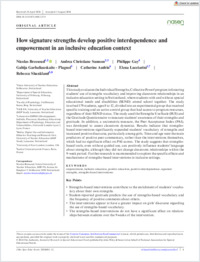How signature strengths develop positive interdependence and empowerment in an inclusive education context
IPC
- Bressoud, Nicolas ORCID Valais University of Teacher Education St‐Maurice Switzerland; Department of Special Education University of Fribourg Fribourg Switzerland
- Samson, Andrea Christiane Department of Special Education University of Fribourg Fribourg Switzerland; Faculty of Psychology UniDistance Suisse Brig Switzerland
- Gay, Philippe UER EN, University of Teacher Education (HEP Vaud) Lausanne Switzerland
- Garbaliauskaite ‐ Plagnol, Gabija Laboratoire DIPHE (Développement, Individu, Processus, Handicap, Education), Department of Psychology, Education and Vulnerabilities Université Lumière Lyon 2 Lyon France
- Audrin, Catherine Media, Digital Use and Informatics Didactics Teaching and Research Unit University of Teacher Education (HEP Vaud) Lausanne Switzerland
- Lucciarini, Elena Valais University of Teacher Education St‐Maurice Switzerland; University of East London London UK
- Shankland, Rebecca Laboratoire DIPHE (Développement, Individu, Processus, Handicap, Education), Department of Psychology, Education and Vulnerabilities Université Lumière Lyon 2 Lyon France; Institut Universitaire de France Paris France
- 2024
Published in:
- Journal of Research in Special Educational Needs. - Wiley. - 2024
empowerment
inclusive education
positive education
positive interdependence
signature strengths
strengths-based interventions
English
This study evaluates the Individual Strengths, Collective Power! program in fostering students' use of strengths vocabulary and improving classroom relationships in an inclusive education setting in Switzerland, where students with and without special educational needs and disabilities (SEND) attend school together. The study involved 179 students, ages 8 to 12, divided into an experimental group that received specific training and an active control group that had access to program resources, regardless of their SEND status. The study used the Strengths Use Scale (SUS) and the Gratitude Questionnaire to measure students' awareness of their strengths and gratitude. In addition, a sociometric measure, the Peer Acceptance Index (PAI), was developed to assess classroom dynamics. Results indicate that strengths-based interventions significantly expanded students' vocabulary of strengths and increased positive discourse, particularly among girls. Time and age were the main predictors of positive peer commentary, rather than the interventions themselves, which had no significant effect on PAI scores. The study suggests that strengths-based tools, even without guided use, can positively influence students' language about strengths, although they did not change classroom relationships within the 9-week period. Further research is recommended to explore the specific effects and mechanisms of strengths-based interventions in inclusive settings.
- Faculty
- Faculté des lettres et des sciences humaines
- Language
-
- English
- License
- CC BY-NC
- Open access status
- hybrid
- Identifiers
-
- DOI 10.1111/1471-3802.12713
- ISSN 1471-3802
- Persistent URL
- https://folia.unifr.ch/unifr/documents/329273
Statistics
Document views: 30
File downloads:
- researchinspeceducneeds-2024-bressoud-howsignaturestrengthsdeveloppositiveinterdependenceandempowermentin_1.pdf: 65
